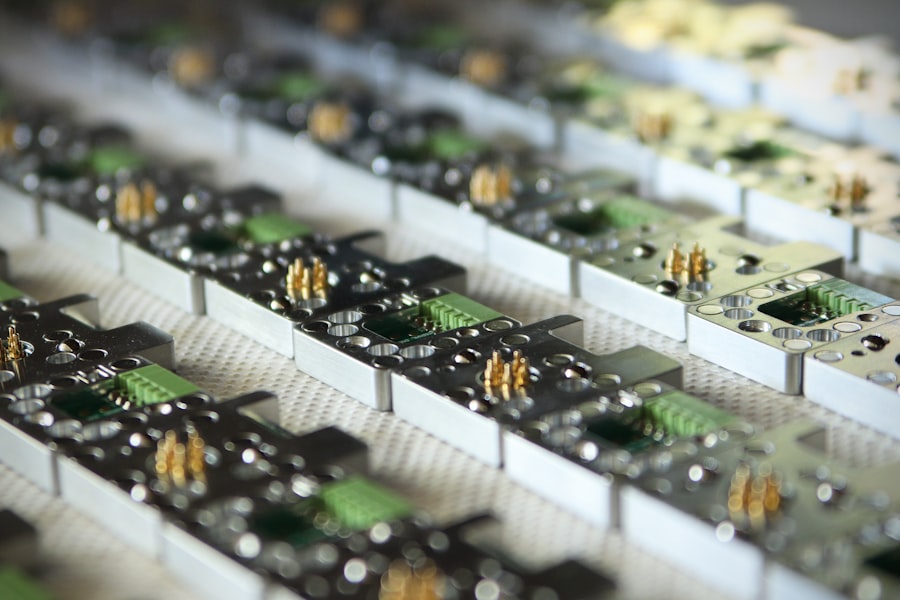Laser hair removal and electrolysis are two popular methods for achieving long-term hair reduction. Laser hair removal uses a concentrated beam of light to target and destroy hair follicles, while electrolysis involves the use of a small electric current to destroy individual hair follicles. Both methods are effective at reducing unwanted hair, but they work in different ways and have their own unique benefits and drawbacks.
Laser hair removal is a non-invasive procedure that can be used to target large areas of the body, such as the legs, back, and chest. It works by targeting the pigment in the hair follicle, heating it up and destroying the follicle without damaging the surrounding skin. This method is relatively quick and can provide long-lasting results, with many people experiencing permanent hair reduction after a series of treatments. However, laser hair removal is most effective on people with light skin and dark hair, as the contrast between the skin and hair makes it easier for the laser to target the follicles.
On the other hand, electrolysis is a more time-consuming and invasive procedure that targets individual hair follicles. It is suitable for all skin and hair types and can be used on smaller areas of the body, such as the face, underarms, and bikini line. Electrolysis works by inserting a tiny probe into each hair follicle and delivering a small electric current to destroy the follicle. While it may take longer to see results with electrolysis compared to laser hair removal, it is considered the only FDA-approved method for permanent hair removal. Additionally, electrolysis can be a better option for people with lighter hair or those who have not seen success with laser hair removal.
Overall, both laser hair removal and electrolysis are effective methods for reducing unwanted hair, but they work in different ways and have their own unique advantages and limitations.
Key Takeaways
- Laser hair removal uses light to target hair follicles, while electrolysis uses a small electric current to destroy hair follicles.
- Laser hair removal is generally more cost-effective than electrolysis, but multiple sessions are required for both methods.
- Laser hair removal is widely available in many spas and clinics, while electrolysis may be harder to find and may require a licensed electrologist.
- Factors affecting the price and availability of both methods include the size of the treatment area, the number of sessions needed, and the location of the service provider.
- Pros of laser hair removal include faster treatment times and larger treatment areas, while electrolysis is effective for all hair colors and skin types but may be more time-consuming.
Cost Comparison: Laser Hair Removal vs. Electrolysis
When it comes to cost, laser hair removal and electrolysis differ in terms of initial investment and long-term expenses. Laser hair removal typically requires multiple sessions to achieve optimal results, with each session costing anywhere from $200 to $500, depending on the size of the treatment area. The total cost of laser hair removal can add up over time, but many people find it to be a worthwhile investment due to the long-lasting results.
On the other hand, electrolysis tends to be more expensive upfront, with each session costing around $50 to $150. However, since electrolysis targets individual hair follicles, it may require fewer sessions overall compared to laser hair removal. This can make electrolysis a more cost-effective option in the long run for some individuals, especially those with smaller treatment areas or those who are not suitable candidates for laser hair removal.
It’s important to consider not only the initial cost of each treatment but also the long-term expenses associated with maintenance sessions. While laser hair removal may require occasional touch-up sessions to maintain results, electrolysis is often considered a permanent solution, which can ultimately save money in the long run. When comparing the cost of laser hair removal and electrolysis, it’s essential to consider your individual needs, treatment areas, and long-term goals to determine which method is the most cost-effective for you.
Availability of Laser Hair Removal and Electrolysis
Laser hair removal and electrolysis are widely available in many cities and towns across the country, with numerous medical spas, dermatology clinics, and specialized hair removal centers offering these services. Both methods are performed by trained professionals who have experience in using the latest technology and techniques to achieve optimal results.
Laser hair removal is particularly popular and widely available due to its efficiency and ability to target large treatment areas. Many medical spas and dermatology clinics offer laser hair removal services, making it easily accessible for those seeking long-term hair reduction. Additionally, advancements in technology have made laser hair removal more affordable and accessible than ever before, with many facilities offering competitive pricing and package deals for multiple sessions.
Similarly, electrolysis is also widely available, although it may be less common than laser hair removal in some areas. Electrolysis is typically performed by licensed electrologists who have undergone specialized training in this method of hair removal. While it may require more research to find a qualified electrologist in some regions, many people find that the permanent results offered by electrolysis make it worth the effort.
Overall, both laser hair removal and electrolysis are widely available in many locations, making it convenient for individuals to access these services and achieve their desired results.
Factors Affecting Price and Availability
| Factors | Affecting Price | Affecting Availability |
|---|---|---|
| Supply and Demand | High demand can increase price | Low supply can decrease availability |
| Production Costs | Higher production costs can lead to higher prices | Lower production costs can increase availability |
| Government Regulations | Regulations can increase production costs and affect prices | Regulations can limit availability |
| Seasonal Factors | Seasonal demand can affect prices | Seasonal production can affect availability |
Several factors can affect the price and availability of laser hair removal and electrolysis treatments. The location of the facility, the experience of the provider, the size of the treatment area, and the technology used can all impact the cost of these procedures. In general, larger cities tend to have more options for laser hair removal and electrolysis, which can lead to increased competition and potentially lower prices.
The experience and qualifications of the provider can also influence the cost of these treatments. Providers with extensive experience and specialized training may charge higher fees for their services, but they may also offer superior results and a higher level of expertise. Additionally, facilities that use advanced technology and equipment may charge higher prices for their treatments due to the increased effectiveness and efficiency of their services.
The size of the treatment area is another important factor to consider when determining the cost of laser hair removal or electrolysis. Larger treatment areas, such as the legs or back, will typically require more time and resources to complete, leading to higher overall costs. Conversely, smaller treatment areas like the upper lip or underarms may be more affordable due to their reduced size and time requirements.
Ultimately, when considering laser hair removal or electrolysis, it’s essential to research providers in your area, compare pricing and package options, and consider factors such as location, provider experience, treatment area size, and technology used to make an informed decision about which method is right for you.
Pros and Cons of Laser Hair Removal and Electrolysis
Laser hair removal and electrolysis each have their own set of advantages and disadvantages that should be carefully considered when choosing a method for long-term hair reduction.
Pros of Laser Hair Removal:
– Efficient for large treatment areas
– Quick treatment sessions
– Long-lasting results for many individuals
– Suitable for people with light skin and dark hair
Cons of Laser Hair Removal:
– May require multiple sessions for optimal results
– Not as effective on lighter or finer hair
– Potential for skin irritation or discoloration
– Can be more expensive over time due to maintenance sessions
Pros of Electrolysis:
– Suitable for all skin and hair types
– Permanent results for many individuals
– Effective on finer or lighter hair
– Can be more cost-effective in the long run for some individuals
Cons of Electrolysis:
– Time-consuming process
– More invasive than laser hair removal
– May cause discomfort during treatment
– Potentially higher upfront costs compared to laser hair removal
When weighing the pros and cons of laser hair removal and electrolysis, it’s important to consider your individual needs, treatment areas, skin type, and long-term goals to determine which method is best suited for you.
Choosing the Right Method for You

When choosing between laser hair removal and electrolysis, there are several factors to consider in order to make an informed decision about which method is right for you.
Firstly, consider your skin type and hair color. Laser hair removal is most effective on individuals with light skin and dark hair due to the contrast between the skin and hair follicles. If you have lighter or finer hair or darker skin, electrolysis may be a better option for achieving permanent results.
Next, think about your treatment areas and long-term goals. Laser hair removal is ideal for targeting larger areas of the body quickly and efficiently, while electrolysis may be better suited for smaller treatment areas or individuals seeking permanent results without the need for maintenance sessions.
Additionally, consider your tolerance for discomfort during treatment. While both methods may cause some level of discomfort, electrolysis is generally considered more invasive than laser hair removal due to its targeted approach to destroying individual follicles.
Finally, take into account your budget and willingness to invest in long-term results. While laser hair removal may require multiple sessions over time to maintain results, electrolysis is often considered a permanent solution that may ultimately save money in the long run.
By carefully considering these factors and consulting with a qualified provider, you can make an informed decision about whether laser hair removal or electrolysis is the right method for achieving your desired results.
Making an Informed Decision
In conclusion, both laser hair removal and electrolysis are effective methods for achieving long-term hair reduction, but they work in different ways and have their own unique benefits and limitations. When considering these treatments, it’s important to weigh factors such as cost, availability, skin type, treatment areas, discomfort during treatment, and long-term goals in order to make an informed decision about which method is best suited for you.
Laser hair removal is efficient for targeting large treatment areas quickly and may provide long-lasting results for many individuals. However, it may require multiple sessions over time and may not be as effective on lighter or finer hair. On the other hand, electrolysis is suitable for all skin types and can provide permanent results for many individuals but may be more time-consuming and potentially more expensive upfront compared to laser hair removal.
Ultimately, by carefully considering these factors and consulting with a qualified provider, you can choose the method that best aligns with your individual needs and goals for achieving long-term hair reduction. Whether you opt for laser hair removal or electrolysis, making an informed decision will help you achieve the results you desire while ensuring a positive experience throughout your treatment journey.
If you’re considering laser hair removal or electrolysis for your face, you may be wondering about the cost and effectiveness of these treatments. A recent article on InLaserHairRemoval.com discusses the price of laser hair removal at LaserAway and provides insights into the factors that can influence the cost. Additionally, the article explores the best laser hair removal options near you, helping you make an informed decision about your hair removal journey. For more information on this topic, check out the article “How Much Does LaserAway Cost?” to gain valuable insights into the pricing and options available for laser hair removal.
FAQs
What is laser hair removal?
Laser hair removal is a cosmetic procedure that uses a concentrated beam of light (laser) to remove unwanted hair. The laser targets the pigment in the hair follicles, heating and damaging them to inhibit future hair growth.
What is electrolysis?
Electrolysis is a method of hair removal that uses an electric current to destroy the growth center of the hair follicle. This process involves inserting a tiny probe into the hair follicle and applying a small amount of current to destroy the follicle’s ability to grow hair.
What are the differences between laser hair removal and electrolysis?
Laser hair removal targets multiple hair follicles at once, making it a quicker process for larger areas. It is also less painful than electrolysis. However, electrolysis is effective for all hair colors and types, while laser hair removal is most effective for people with light skin and dark hair.
What are the potential side effects of laser hair removal and electrolysis?
Common side effects of laser hair removal include temporary skin irritation, redness, and swelling. Electrolysis may cause temporary redness, swelling, and scabbing at the treatment site.
How much does laser hair removal and electrolysis cost?
The cost of laser hair removal and electrolysis varies depending on the size of the treatment area, the number of sessions required, and the location of the treatment facility. Generally, laser hair removal is more cost-effective for larger areas, while electrolysis may be more cost-effective for smaller areas.
Which method is best for facial hair removal?
Both laser hair removal and electrolysis can be effective for facial hair removal. The choice between the two methods depends on individual factors such as hair color, skin type, and desired results. It is recommended to consult with a qualified practitioner to determine the best option for facial hair removal.






